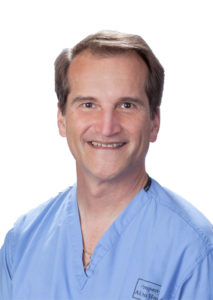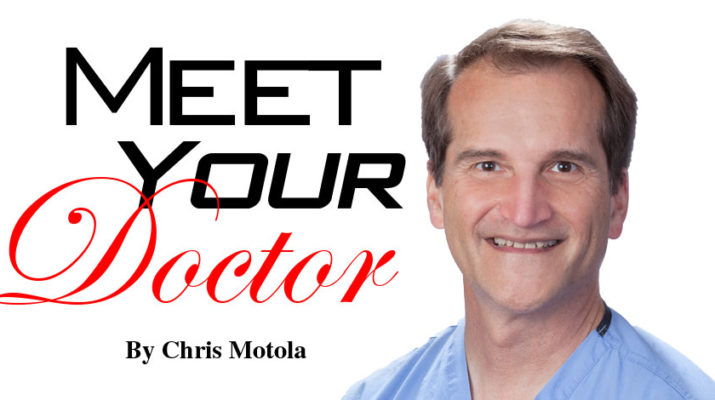Coronavirus unintended consequence: Dramatic drop in the number of people coming to the hospital with heart attacks, says chief of cardiology at Rochester Regional. He discusses role of cardiologists in treating COVID-19 patients
By Chris Motola

Q: Hospitals are obviously under a lot of stress right now. What effect does the COVID-19 pandemic have on specialties like cardiology that aren’t as directly involved in treating the disease?
A: It’s affected every aspect of healthcare. Cardiology is actually quite involved for a number of reasons. In the people who are sick enough to be hospitalized, many of them are going to have some kind of cardiac issue. It’s actually pretty common. There’s an enzyme in the blood when the heart is stressed called troponin that is elevated on 70-80% of people sick enough to be hospitalized for COVID. About a quarter of people will develop some degree of inflammation and weakening of the heart. We’re very involved with people sick enough to get admitted, and especially with those sick enough to end up in the ICU on ventilators, who can wind up with irregular heartbeats. The other thing that’s amazing to everyone across the world right now, not just locally, is that the number of people coming in with heart attacks or chest pain is a lot lower. Nobody really knows why for sure, but we think it’s because people are scared to come to the hospital. There are also some theories about how, with fewer cars and factories running, there’s less pollution. The drop in pollution makes a little bit of a difference, but doesn’t explain everything we’re seeing.
Q: You touched on quite a bit there, so I want to zoom in on some of it. When you’re talking about stress on the heart, are we talking preexisting conditions or stress from the disease itself?
A: So if you have coronary disease, valve disease, you’re more likely to have some complication from COVID, but the majority of people who have the enzyme elevated have never had any heart history in the past. It’s a strain on anyone’s heart who gets it bad. As you well know, 80% of people get the virus and it’s pretty mild. It’s the 20% who get it bad where all these complications happen.
Q: What kinds of interventions are you doing for those patients?
A: In most people it’s a secondary concern, so the vast majority who develop complications are being treated with medications. We have a lot of effective medications that help a weakened heart. We had a case last week with a gentleman who came in with COVID, who was having a heart attack. And we treated him like any other patient who comes in with a heart attack. We brought him to the heart catheterization laboratory and got him new supply to his heart. So the thing to stress to people is that, even if you’re COVID-positive, we’re treating your heart like we would with any other patient, even without the pandemic.
Q: Moving on to the patients you’re not seeing, what can you do to make sure people who need to be seen aren’t being discouraged from being seen?
A: I fully understand that no one really wants to come to the hospital ever, and I can fully understand that people really don’t want to come to the hospital when they’re afraid of getting exposed to COVID. It’s perfectly understandable, but people need to remember the warning signs of a heart attack: chest pain, breathing troubles, unexplained dizziness. Just like in normal times, they need to be treated for that. I can tell you there was an article I saw yesterday that emergency systems in New York City are coming to a lot more cardiac arrests at people’s homes because people aren’t coming in. So they’re waiting until their heart stops to call and, as you well know, your chance of survival is much, much lower at that point. So people need to understand we’re still open for business for the normal stuff. Don’t come here for trivial problems, but if you’re having chest pains or shortness of breath, that’s not normal. Get checked out.
Q: You mentioned the reduction in pollution related to lockdowns and quarantines around the world. Is that having a measurable effect on health?
A: In some places, for sure. Places like Los Angeles, India, China. Rochester’s pollution isn’t that bad this time of year, so it’s probably a negligible to small effect around here. We do have some days in the summer where the ground ozone level is very high and can be dangerous, but it’s a small effect compared to cigarette smoking, diabetes, high blood pressure here in Rochester. We luckily have this big lake right next to us that keep fresh air circulating. It’s bigger problem out West because the pollution gets trapped behind the mountains, and in India and China because they lack many pollution controls. There’s a very strong correlation between higher pollution levels, especially particulate pollution, and more heart and lung troubles.
Q: What role has telehealth been playing during the pandemic?
A: That’s actually what I’m doing with the rest of my day. We are seeing a few patients in the office, mainly new referrals who need a physical examination, but everyone else I would see in the office we’re doing telephone or video visits. We’re doing it on 100% of our revisits, because we really want people to stay home unless absolutely necessary. The 5% or so who aren’t comfortable with that, we’re just moving their appointments back.
Q: What permanent effects, if any, do you think the pandemic will have on the way hospitals operate?
A: Good question. I would be guessing, obviously, but a lot of it will come down to what Medicare and the insurers do. Up until the pandemic, reimbursement rates were low on the visits. During the crisis they’re paying us the same whether it’s a video visit or in-person visit. If the public feels this is a good thing, they should keep pressure on insurers and the government. I like to see people face-to-face, so I don’t think it’ll ever stay at 100% like it is now out of necessity, but 50% of my visits could easily be done this way.
Lifelines
Name: Gerald M. Gacioch, M.D.
Position: Chief of cardiology at Rochester Regional Health
Hometown: Syracuse
Education: Bachelor’s degree in biology from SUNY Albany; medical degree (1984) from the Johns Hopkins University in Baltimore. Medical residency at Johns Hopkins and general cardiology and interventional cardiology fellowships at the University of Michigan in Ann Arbor. Also earned his master’s in medical management from the Carnegie Mellon University in Pittsburgh.
Affiliations: Rochester General Hospital
Organizations: American Medical Association; American College of Cardiology; American Heart Association
Family: Wife, four grown children, three granddaughters
Hobbies: Running, backpacking, kayaking

